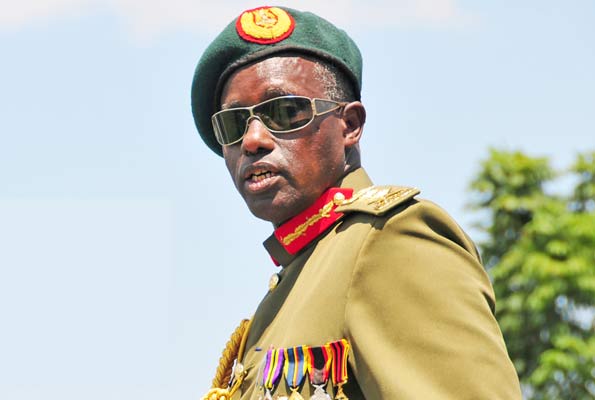The Security Minister, Gen Elly Tumwine has justified the use of sticks and live ammunition in quelling recent violence in Arua and subsequent riots that broke out in Kampala, saying that it is warranted under certain situations.
The military has come under fire in recent weeks for the brutality with which soldiers beat up civilians and journalists in Kampala. Video footage by several media outlets showed soldiers severely beating a journalist working with Reuters as well as other civilians during their arrest.
Some of the victims were not resisting arrest.
While responding to queries raised by the press on Tuesday, Gen Tumwine said that soldiers are allowed to be armed with sticks so as to apply minimum force.
“In the military, if you don’t have a gun, an officer has a cane or stick. That is a symbol that he is a commander. Us in the war, the commander is free to beat you to go ahead,” Tumwine said at a news conference.
“These sticks are used for minimum force and they are not for beating nothing. They are meant to demobilize you from using force and resisting arrest. And these sticks are not as bad as the hard batons,” he added.
He said that security personnel must be armed with a whistle, hand cuffs, baton and where necessary a stick.
Regarding the use of live ammunition, the Security Minister said that: “If your actions are going to cause violence against others, a firearm can be used. If you resist arrest, it can be used. If you try to escape, firearms can also be used. So, let’s be lawful”.
So far, about three people have been shot and killed during the violence in Arua, Mityana and Kampala while others are still nursing wounds sustained from stray bullets.
The General gave assurance that investigations are ongoing both on the part of the Police and the military, and that the officers found to have had excesses in handling the riots will be penalized.
“The Chief of Defence Forces instituted a board of inquiry to investigate. The IGP also opened general inquiry to probe into rights violations. These will form our subsequent actions”.
“This is the normal procedure. In UPDF when we carry out an operation we analyze and if there are question marks, we get a board of inquiry which is followed by the trial”.
He faulted the media of accusing, trying and sentencing the errant officers before investigations into the matter are complete.
“We have disciplined our forces seriously, we have been tough on them and executed some of them without the media talking about it. It is in our own interest to have a disciplined security forces”.
But he said that security forces will remain firm and resolute in maintaining law and order and that no one is above the law. Lawlessness will not be tolerated at all, he said.
On the issue of continuous assault of journalists while in the course of their duty of dissemination of information, Tumwine said that the military is planning to engage the press with an aim of coming up with what he called ‘Standard Operating Procedures’.
He however noted that some of the problems the journalists and the so-called torture of MPs suffered during the violent situations should be taken as occupational hazards.
“When it rains, it doesn’t sort out who it will soak. The moment you go in the rain, you are all liable to have some soaking,” he said.
“Having pain or injury is not torture. I have an injury on my eye and it was from a violent situation. I was not tortured but hurt. Sometimes, these are occupational hazards”.
He said that “in the military, rules of the war change after the first bullet” and that the actions taken are sometimes determined by what situation is at hand.
He also appealed to the young people in Uganda to desist from creating “generational barriers” simply because they are the majority population.
“If you don’t understand something, you won’t do it well. Understanding is not where you are demanding rights from people who are armed or misusing democratic means and freedom of expression”.








